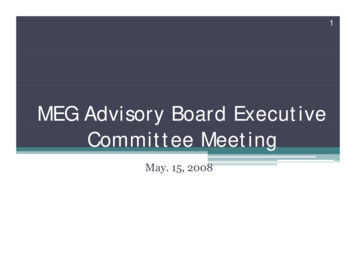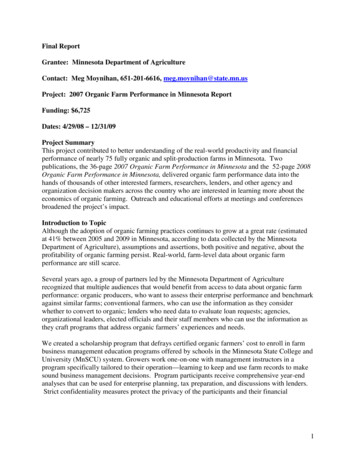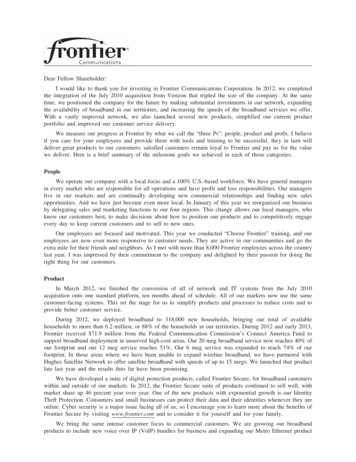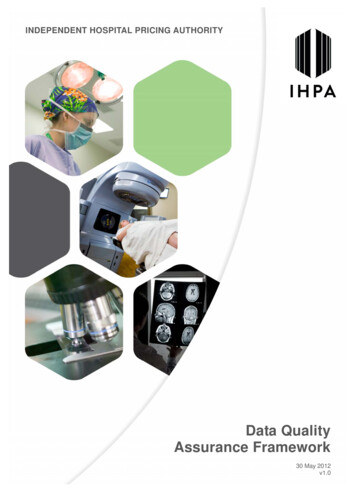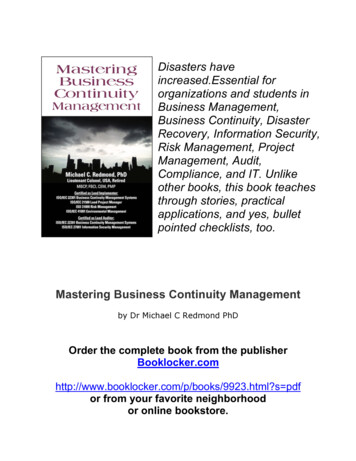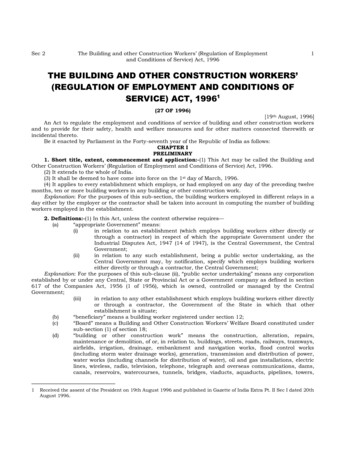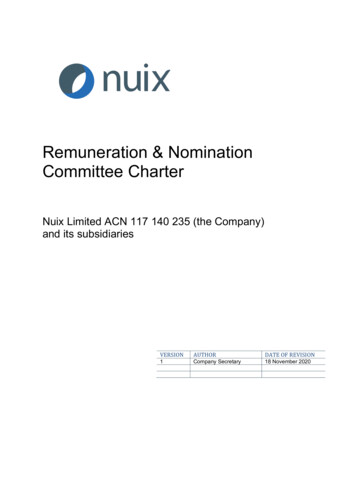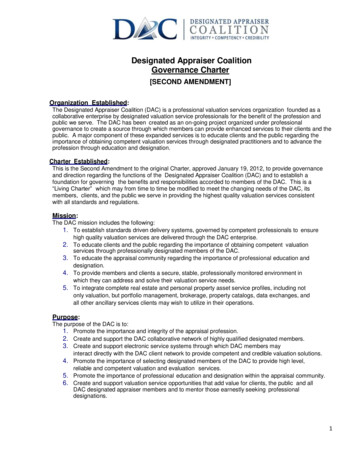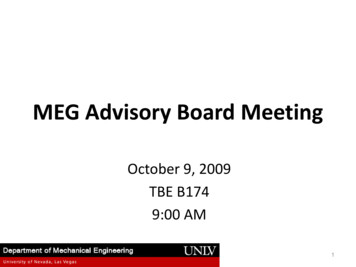
Transcription
MEG Advisory Board MeetingOctober 9, 2009TBE B1749:00 AM1
Agenda Welcome (Michelle Miller, Clark McCarrell) New leadership in MEG Advisory Board MEG Advisory Board Update (Michelle Miller) Department Update (Woosoon Yim)2
MEG Advisory Board Update3
MEG Advisory Board UpdateMembership Current membership update Michelle Miller responsible for membership list Initial review eliminated 7/34 (3 YMP and 4 others) Participation will be monitored and membership will beadjusted accordingly Two new members identified Bradford Colton Manuel SiFuentes No Executive Committee4
MEG Advisory Board UpdateSubcommittee Subcommittees Volunteers representing MEG to all-college board meetingare: Outreach: Frederick Peters, Michael SchwobTechnology/Innovation: Clark McCarrellResearch and Fundraising: no MEGs12-13 members on all subcommittees so no more needed Primary business for FY10 is MEG program review for ABETvisit. Last review was in 2003 before 2004 ABET visit5
MEG Advisory Board Update-ABETRelated Issues In our 2004 ABET Self-Study The board helps with several issues including: Identification of needs for new programs Review of MEG curriculum Upgrades of educational labs Identification of possible research opportunities Internship programs The main areas of involvement include: Review of MEG Curriculum. Continual tuning of Industry surveys. Continual discussion of outcome methods. Review of the ABET Self-study report by three representatives of theboard.6
MEG Advisory Board Update-ABETRelated Issues Any changes or suggestions for 2010 ABET Self-Study? Michelle Miller volunteered to lead the committee First draft of Self-Study Report is being prepared byDepartment Will be available for review by Winter Break of 2009 Need volunteers Curriculum review (Thermal, Fluid, Material/Design, Dynamics/Control)Survey assessment (Industrial, Alumni survey)Student Relations (Internship, Senior Design)Sustainable funding for lab improvement7
Mechanical EngineeringCurriculum Evaluation FormReviewer(s):Date:1.0 Description of Curriculum Area Being Reviewed1.Area:2.Course Title(s):3.Instructor(s):4.Description of course(s):2.0 Summary of course goals, what are the major concepts the course is trying convey from thereviewer’s point of view:3.0 Strengths of course and/or curriculum (please provide a list):4.0 Performance Summary and Trends:5.0 Actions for Performance Enhancement(s):6.0 Other comments (not requited):*Reviewer should attend one class of course being reviewed. Get a syllabus and compare to coursecatalog. Make notations of course delivery by educator and student participation in class.2003 Final Report contains evaluations for reference8
MEG Advisory Board Update-Survey Annual questionnaire for ME advisory board/localindustry Industry Survey collects valuable information Each board member will be responsible for getting 5responses Recommend sending and following up with phone call orpersonal visit Will be used as a tool for assessment of the program (2010ABET) Alumni survey (every three years, last one in F08) Will review next semester to see if adjustments need to bemade9
MEG Advisory Board-Bylaws Michelle Miller has prepared a draft for review– Please comment by October 30, 2009 tomillerme@nv.doe.gov– ‘No comment’ will be interpreted as acceptance10
Department Update11
Department & Faculty News Prof. Mauer is a college curriculum committee chair and also MEGUndergraduate Coordinator.Prof. Brendan O’Toole is a Graduate Coordinator.MEG Undergraduate Curriculum Committee:– G. Mauer, S. Mousajes, D. CookProfessor Mohamed Trabia is in charge of NWCCU universityaccreditation in Spring 2010.Prof. Robert Boehm was awarded 5.6M from DOE for his research withPulte Home and NV Energy.Prof. D. Reynolds & Prof. O’Toole received 700K from Army for seatshock isolation project.New book by Dr. ReynoldsProfessor Darrell Pepper was appointed to the ABET EAC (EngineeringAccreditation Commission) and working as a reviewer for ABETaccreditation.12
College NewsCollege Homecoming event Oct. 15, 5:30-9:00 PM (Wineetc.) Mendenhall Innovation Design Lab OpeningPerini Construction Eng & Management Lab OpeningDr. W. Wells tributeAlumni Chapter IntroductionNov. 13, 8:30AM All-College Board MeetingDec. 15 Fall 2009 Commencement
Future MEG Website14
Enrollment Trends 5 Year(2008-2009)F2005F2006F2007F2008Full-time Students178193214246Part-time Students26425153Student FTE1106105.4109.6129.216 (B.S.)20 (B.S.)25 (B.S.)35 (B.S.)33 (M.S.)17 (M.S.)22 (M.S.)20 (M.S.)2 (Ph.D.)1 (Ph.D.)10 (Ph.D.)6 (Ph.D.)Graduates(B.S./M.S./Ph.D. DegreeConferred)Year(2009-2010)F200915
Admission Standards for Freshmen 5YearsAcademicYearComposite ACTMIN.AVG.Composite SAT (V/M)MIN.AVG.AVG.Number ofNewStudentsEnrolledPercentile Rank in 2005-200623.5560/5230.686416
Undergraduate HeadcountCollege Update: Undergraduate HeadcountDepartmentFall 2004Fall 2005Fall 2006Fall 2007Fall 2008Civil &EnvironmentalEngineering265282247264299College ofEngineering117125158185163ComputerScience,School of334299293264289Electrical neering182204235265299Undergraduate Total:1245128313381409151017
GraduateHeadcountDoctoralHeadcountCollege Update: Graduate HeadcountMastersDepartmentCivil & EnvironmentalEngineeringFall 2004Fall 2005Fall 2006Fall 2007Fall 200853553833318915College of EngineeringComputer Science,School of6057595236Electrical & alEngineering6957505545226216193192177Fall 2004Fall 2005Fall 2006Fall 2007Fall 2008Civil & EnvironmentalEngineering1926302423Computer Science,School of32223Electrical & ComputerEngineering44479414Graduate eering1922272924Doctoral Total:455467636318
Graduate HeadcountDepartment: M.S. & Ph.D. HeadcountProgramFall 2004ASEMSFall 20052Fall 20061MEGBIOMEGMS69MNEMSMEGPHD19Fall 2007Fall 2008152251444532457622272924M.S.19
Undergraduate Degrees ConferredDepartment: Degree ConferredAcademic -072007-0815121620251512162025Undergraduate Total:Academic S1829MSMNEMSGraduate emic 08PHD-EGMEGPHD542110Doctoral Total:54211020
Research Expenditure FY 2005-2007Department NameDean, College of 7,402.9555,831.39369,816.42Civil & ,243.3717,999,975.79School of Computer 64.38Electrical & 943.30Total: College of 1
Program Ranking (Internal) MEGCEEECECS91%85%84%71% Informatics, Construction Management,Entertainment Eng & Design are notevaluated22
S09 Senior Design Results for MEG Grand PrizeHome Power Meter: Kenneth Hynes and DevinTaylor 1st PlaceLots of Pepper Now-Sean Birnbaum, EldenGoddard, Christian Herrera, Stoil Pamoukov 2nd PlaceSupersonic Water Table: David Glaser and WadeMcElroy23
Changes of MEG Curriculum and Lab Elimination of ME 330L and creation of ME319/319Lfor 2008-2010 catalog. Hope to have a survey to industry for C programmingneeds for MEG students Taking FE Exam (Mechanical Engineering Specific) isrequirement for graduation. Now we require ME492FE Exam Review (1 cr.). Students who fail the FE Exam, must reregister for the testto graduate (2008-2010 catalog). Minor changes for qualification for the AdvancedStanding. ME 337L and ME421L are integrated in B121. ME 100L has a new home in CBC C-234 Dr. Zhao’s Biomedical lab has a new home in SEB24
(15)(14)(15)(17)(15)(16)(19)(16)Total(127)25
MEG Program Re-description(1)26
MEG Program Re-description(2)27
MEG Program Re-description(2)28
Program Assessment Internal Assessments– Course and Instructor Evaluations(Every Semester): Lab Survey Teacher Evaluation Evaluation of (A)-(K) ABETEducational Outcomes Evaluation of Course Objectives Exit Interviews (EverySemester)– Assessment by Faculty (EverySemester)– Program Internal Review byUniversity (Every Five Years) External Assessments FE Exam Results (Every Semester) Judging Senior Design Competition(Every Semester) MEG Advisory Board / LocalIndustry Surveys (Annual) MEG Advisory Board / LocalEngineers Reports (Tri-Annual) Alumni Surveys (Tri-Annual) ABET Accreditation (Every Six Years)29
MEG Educational Objectives andOutcomes#1 #2 #3 Provide mechanical engineering graduates with technical capabilities. The objective outcomes are:– Fundamental knowledge of state-of-the-art and evolving areas associated with the mechanicalengineering field.– Ability to design and conduct experiments, analyze data, and utilize statistical methods.– Ability to solve open-ended design problems.– Ability to use modern computational techniques to solve engineering problems.– Ability to mathematically model and analyze engineering systems.Prepare the mechanical engineering graduates to have effective workplace skills. The objective outcomesare:– Oral and written presentation of technical information.– Introductory knowledge of economics.– Working on a multi-disciplinary team with peers.– Motivation to pursue lifelong learning.Instilling a sense of responsibility as a professional member of society. The objective outcomes are:– Commitment to professional and ethical behavior in the workplace.– Awareness of world affairs and cultures.– Recognition of the impact of engineering on local and global societies.– Seeking professional licensure.30
Mapping of Assessment Methods31
Selected Examples of Assessment ResultsNumber of ResponsesYearAlumni SurveyIndustrial Survey20055292006N/A62007N/A820084952009N/A1432
Alumni Survey SummaryWhen did you graduate?2006-20082003-20054372000-2002 1997-1999 1994-1996 1991-1993 Prior to198855103431311265437mail1webWhat type of position do you currentlyhold?27Technical168 Total(43)Technical /ProjectManagement439R&DManagement011Student (FullTime5Other12mailEducatorAssistantProf. ofengineer413When did you graduate?6171138121web3Total12What type of position do you currently hold?1082061542100234567565432011Where are you currently ACA71801MountainCentral54Pueblo-CO ounted2716033
Educational Outcomes(Both web based and mail survey are combined)Your studies in UNLV helped you strongly agreedevelop the following capabilities:A fundamental knowledge of state10of-the-art and evolving areasassociated with the mechanicalengineering pplicable0RatingAverage44The ability to design and conductexperiments, analyze data, andutilize statistical methods10236111The ability to solve open-endeddesign problemsThe ability to use computers insolving engineering problemsThe ability to mathematicallymodel and analyze engineeringsystems1519710014225110Oral and written presentation oftechnical informationIntroductory knowledge ofeconomicsWorking on multi-disciplinaryteam with peersMotivation to pursue life-longlearningA commitment to professional andethical behavior in the work placeAn awareness of world affairs andculturesRecognition of the impact ofengineering on local and globalsocieties12Seeking professional licensure4242431521402Do you feel that studying at UNLVmade you motivated to gainprofessional registration?ResponseCount1614120843191110Do you feelthat studyingat UNLVmade youmotivated togain 1023431416175016191331144484548Preparation(Both web based and mail survey are combined)much more more preparedpreparedDo you consider that studying at UNLVmade you prepared to enter theworkforce compared to graduates ofother universities?210same level ofpreparednessless preparedmuch lessprepared2511not applicable ResponseCounted14034
General Performance(Both web based and mail survey are combined)Your studies in UNLV helpedstrongly agreeyou gain proficiency in thefollowing areas:123456agreeneutraldisagreestrongly disagreenot applicableMathematics12265001Thermal Sciences14215102Fluid Mechanics131611202Materials / Mechanical DesignDynamics / Automatic ControlComputer Skills11121122122341370121113503-D Design / Engineering Drawings21815432Evaluation of Engineering Systems3288212Propose Innovative Solution toEngineering Problems72610100Communication Skills81716300Willingness to Work throughChallenging ProblemsEffectiveness in Teams12221000072212300Ability to Handle Peer Criticism ofTheir Projects or DesignsLeadership Skills6201430171420300Involvement in ProfessionalOrganizations71714402Others (Please specify)0120027891011121314151635
Academic Knowledge LevelAlumni Survey (2005, 2008)Results for Academic Knowledgeand General Skills3-D Design / EngineeringDrawingsComputer SkillsDynamics / Automatic Control2008 SurveyMaterials / Mechanical Design2005 SurveyFluid MechanicsThermal SciencesMathematics0.01.02.03.04.0Avg. Ranking(5 Strongly Agree, 1 Strongly Disagree)5.0Objective 1: Provide mechanicalengineering graduates with technicalcapabilities.General Engineering SkillsInvolvement in Professional OrganizationsLeadership SkillsAbility to Handle Peer Criticism of Their Objective 2: Prepare mechanicalengineering graduates to haveeffective work place skills.2008 SurveyEffectiveness in Teams2005 SurveyWillingness to Work through Challenging Communication SkillsPropose Innovative Solution to Evaluation of Engineering Systems0.01.02.03.04.0Avg. Ranking(5 Strongly Agree, 1 Strongly Disagree)5.036
024681012Number of Responses1416very motivatedslightly motivatedneutralslightly unmotivatednot motivated at allnot applicableFigure 2.5 Alumni Survey Question #5: Do you feel that studying at UNLV made you motivated to gain professional registration?05101520Number of Responses2530much more preparedmore preparedsame level of preparednessless preparedmuch less preparednot applicableFigure 2.6 Alumni Survey Question #6: Do you consider that studying at UNLV made you prepared to enterthe workforce compared to graduates of other universities?Objective 3: Instilling a sense of responsibility as a professional member ofsociety.37
2008AverageTotal e 08Agree(3)2005Strongly Agree(5)2005Cumulative Alumni Survey Results for Educational Objectives in 2005and 2008 Ranking: (5 Strongly Agree and 1 Strongly Disagree) based onEducational Outcome questions:Provide mechanical engineeringObjective 1 graduates with technicalcapabilities.24.1%30.0%57.6% 52.6% 15.2% 12.7% 2.4% 1.9%0.0%2.3% 0.7% 0.5%44Prepare mechanical engineeringObjective 2 graduates to have effective workplace skills.24.7%21.8%46.3% 43.1% 22.1% 28.2% 4.8% 5.7%1.3%0.6% 0.9% 0.6%3.93.8Instilling a sense of responsibilityObjective 3 as a professional member ofsociety.17.9%12.8%38.4% 39.0% 29.7% 36.6% 8.3% 7.6%2.6%2.3% 3.1% 1.7%3.53.538
Spring 2009 Industry Survey39
Industry Survey ResultsSpring2005Spring 2006Spring 2007Spring2008Spring20095 yr Average3.94.23.443.23.7A fundamental knowledge of state-of-the-art and evolving areas associated withthe mechanical engineering field4.24.23.33.63.1The ability to design and conduct experiments, analyze data, and utilizestatistical methods3.64.73.14.23.2The ability to solve open-ended design problems4.24.03.44.23.1The ability to use computers in solving engineering problems4.04.23.94.63.5The ability to mathematically model and analyze engineering systems3.64.23.53.43.1Objective 2: Prepare mechanical engineering graduates to have effectivework place skills.3.74.33.33.63.1Oral and written presentation of technical information3.44.53.53.02.8Introductory knowledge of economics3.43.53.03.63.0Working on multi-disciplinary team with peers3.94.53.33.82.9Motivation to pursue life-long learning3.94.73.44.03.543.63.33.23A commitment to professional and ethical behavior in the work place4.65.03.94.43.0An awareness of world affairs and cultures3.23.22.93.43.3Recognition of the impact of engineering on local and global societies3.33.03.03.62.9Seeking professional licensure3.73.33.43.23.0Objective 1: Provide mechanical engineering graduates with technicalcapabilities.Objective 3: Instilling a sense of responsibility as a professional member ofsociety.3.63.3Ranking (5 Strongly Agree and 1 Strongly Disagree)40
2000-2009 Cumulative Industry Survey Results: Doyou consider UNLV graduates prepared to enter theworkforce compared to graduates of otheruniversities?2000-2009 Cumulative Industry Survey Results:Do you feel that UNLV graduates are motivated to gainprofessional registration?80%60%68.0%41.4%2005-2008 Data2000-2004 %Percentage of ResponsesPercentage of Responses46.0%58.0%60%40%25.3%20%18.0%2005-2008 Data27.0%2000-2004 Data20.6%10.3%5.0%2.5%0%5.0%0.0%41
1.a. Fundamental knowledge of state-of-the-art and evolving areasassociated with the mechanical engineering field.xk) an ability to use the techniques,skills, and modern engineering toolsnecessary for engineering practice.xxxxxxx2.d. Motivation to pursue lifelong learning.3.c. Recognition of the impact of engineering on local and globalsocieties.3.d. Seeking professional licensure.j) a knowledge of contemporary issuesx2.b. Introductory knowledge of economics.3.a. Commitment to professional and ethical behavior in theworkplace.3.b. Awareness of world affairs and cultures.i) a recognition of the need for, and anability to engage in life-long learningx2.a. Oral and written presentation of technical information.2.c. Working on a multi-disciplinary team with peers.h) the broad education necessary tounderstand the impact of engineeringsolutions in a global, economic,environmental, and societal contextg) an ability to communicate effectivelyf) an understanding of professional andethical responsibilitye) an ability to identify, formulate, andsolve engineering problemsx1.b. Ability to design and conduct experiments, analyze data, andutilize statistical methods.1.c. Ability to solve open-ended design problems.1.d. Ability to use modern computational techniques to solveengineering problems.1.e. Ability to mathematically model and analyze engineering systems.d) an ability to function onmultidisciplinary teamsUNLV MEG Program Outcomesc) an ability to design a system,component, or process to meet desiredneeds within realistic constraints such aseconomic, environmental, social,political, ethical, health and safety,Criterion 3 (a) through (k)a) an ability to apply knowledge ofmathematics, science, and engineeringb) an ability to design and conductexperiments, as well as to analyze andMEG Outcomes vs ABET Outcomesxxxxxxx42
Relation between MEG courses andOutcomesProgram OutcomesHighly Related CoursesSomewhat Related Courses1.a. Fundamental knowledge of stateof-the-art and evolving areasassociated with the mechanicalengineering field.1.b. Ability to design and conductexperiments, analyze data, andutilize statistical methods.1.c. Ability to solve open-ended designproblems.1.d. Ability to use moderncomputational techniques to solveengineering problems.1.e. Ability to mathematically modeland analyze engineering systems.2.a. Oral and written presentation oftechnical information.2.b. Introductory knowledge ofeconomics.2.c. Working on a multi-disciplinaryteam with peers.2.d. Motivation to pursue lifelonglearning.3.a. Commitment to professional andethical behavior in the workplace.3.b. Awareness of world affairs andcultures.3.c. Recognition of the impact ofengineering on local and globalsocieties.3.d. Seeking professional licensure.43
Life nitiesand Fine ArtsxxSocial SciencesMathematics 1a) an ability to apply knowledge of mathematics,science, and engineeringConstitutionsCriterion 3 (a)through (k)WorldLiteratureUNLV GeneralEducation CoreEnglishCompositionRelation between GE and Outcomesb) an ability to design and conduct experiments, aswell as to analyze and interpret datac) an ability to design a system, component, orprocess to meet desired needs within realisticconstraints such as economic, environmental,social, political, ethical, health and safety,manufacturability, and sustainabilityxd) an ability to function on multidisciplinary teamse) an ability to identify, formulate, and solveengineering problemsf) an understanding of professional and ethicalresponsibilityg) an ability to communicate effectivelyh) the broad education necessary to understand theimpact of engineering solutions in a global,economic, environmental, and societal contextxxxxxxxxxxi) a recognition of the need for, and an ability toengage in life-long learningxj) a knowledge of contemporary issuesk) an ability to use the techniques, skills, andmodern engineering tools necessary forengineering practice.1 These are distribution area for all engineering student2 Every student must complete a three-credit multicultural course and a three-credit international course. Courses satisfying otherrequirements may simultaneously satisfy the multicultural and international requirements except one course cannot satisfy both themulticultural and the international requirements.44
Cumulative Lab Survey for Each Lab45
Cumulative Lab Survey for Questions46
Student Evaluation of (a)-(k)47
Exit Interview(Outcomes)48
Exit Interview (Lab Survey)49
Exit Interview (Post-Graduate Survey)50
FE ExamDate of FE ExamFall 2003Spring 2004Fall 2004Spring 2005Fall 2005Spring 2006Fall 2006Spring 2007Fall 2007Spring 2008Fall 2008Spring 2009Number 252212231151
Relation of FE to MEG Outcomes52
Percentage of Correct Answer for AM& PM Exam (F03 to S09)53
Comparison with National Norm54
2010 ABET Self-Study Report All of previous assessment results andcontinuous program improvement plans mustbe summarized with supportingdocumentation. First draft will be available in January 2010 The report is due to ABET by July 1, 2010. Actual visit will be September 2010.55
Will be used as a tool for assessment of the program (2010 ABET) Alumni survey (every three years, last one in F08) Will review next semester to see if adjustments need to be made 9. MEG Advisory Board-Bylaws Michelle Miller has prepared a draft for review - Please comment by October 30, 2009 to millerme@nv.doe.gov - 'No comment' will be interpreted as acceptance 10. 11 .
